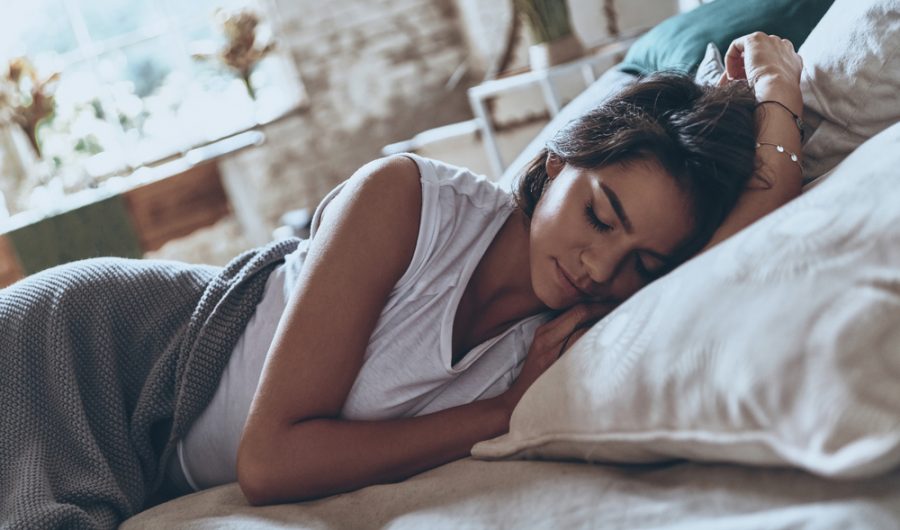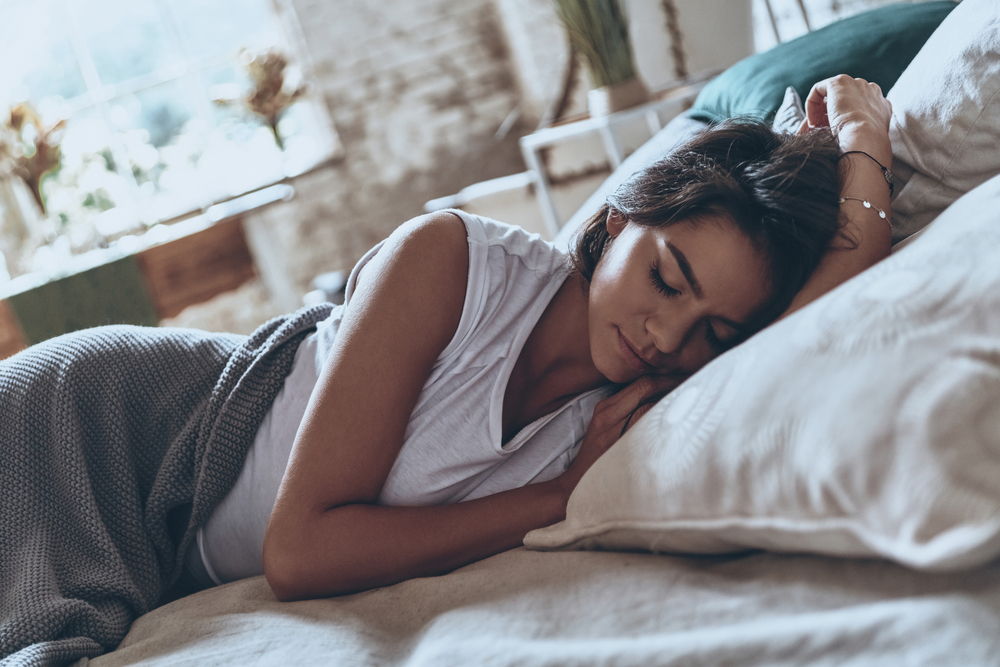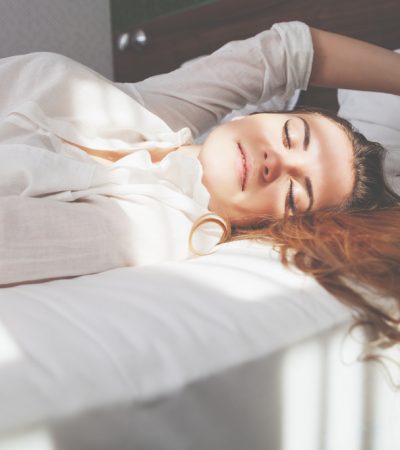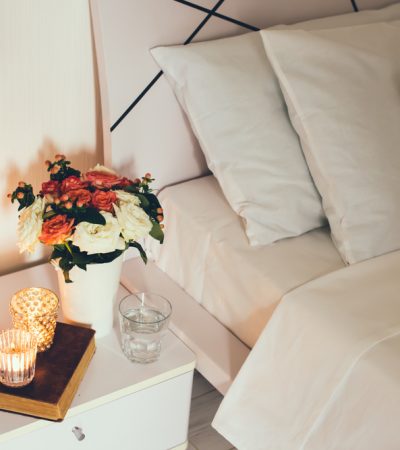It’s well documented that women have more problems sleeping than men, with the hormone variation of the menstrual cycle being one of the main reasons. In fact, a poll conducted by the National Sleep Foundation in 2007 suggested that 33% of women suffer from disturbed sleep during their menstrual cycles. As part of our “Sleep Week” with Warren Evans, we’ve enlisted their very own Sleep Consultant, Dave Gibson from The Sleep Site, to help shed light on how your monthly visitor (and PMS) could be wrecking havoc on your sleep.
There are two main hormones involved in the cycle:
Oestrogen, which builds up during the first 14 days of the cycle (follicular phase) and peaks just before ovulation at day 14 of the cycle, helping to stimulate the release of the egg via Luteinising Hormone.
Progesterone, which rises after ovulation (luteal phase) to maintain the lining of the uterus and then falls just before menstruation on day 28, as the lining of the unfertilised uterus breaks down.
In general, these hormones have different impacts on the body as a whole, with Oestrogen being an energy booster and Progesterone having a sleep-inducing effect.
There are three main times when women with regular cycles report increased sleep disturbances. These are when the hormone levels change.
- Premenstrual (7 out of 10 woman report changes here, 3 to 6 days before starting their period). This is often linked to PMS (Premenstrual Syndrome) symptoms; the more severe the PMS the more sleep is seemingly disrupted.)
- During menstruation
- Around ovulation
Premenstrual effects on Sleep
Days before the start of a period, Oestrogen and Progesterone levels drop. Since, Progesterone has a calming effect on the body; it is thought that the removal of this sedation causes many women to experience insomnia. This decrease also affects the body’s temperature control and therefore, sleep quality. During this time, there is also a decrease in REM (rapid eye movement) sleep, which is when we dream. REM is the deepest and most restorative sleep stage, which could explain why women feel so groggy when they have PMS.
Those that suffer more are thought to have either a more abrupt withdrawal of Progesterone or a higher level that fell faster. For those who are sensitive there is also a drop in mood and increased anxiety or depression, which can disrupt sleep.
The Oestrogen drop at this time creates cravings and achy joints. Oestrogen is also involved in the uptake and utilisation of certain minerals including magnesium. Low levels of magnesium can exacerbate the aches, pains and cramps of PMS.
The womb releases prostaglandins to initiate contractions, which ultimately give you your period. In excess, they can cause muscle cramps and as they diffuse into nearby areas, period pains can radiate into backs and down legs. If these hormone-like chemicals make it into the blood, they can exert a more widespread inflammatory response with many women experiencing headaches and aches and pains all over the body.
In fact, over 20% of all women report that they get migraines during their period, with the highest risk on the first day.
My Top Tips
- Exercise regularly
Naturally alleviating stress, anxiety and depression, exercise can relieve menstrual pain. Exercise also helps to increase levels of chemicals called endorphins. It is likely that a lack of endorphins can affect your sensitivity to pain.
- Get outside in the sunlight
This strengthens our circadian rhythm (body clock). It also helps the body produce vitamin D, which is associated with good quality sleep.
- Bring relaxation into your daily routine
Yoga and other healing activities that help you relax such as meditation, deep breathing or relaxation exercises are really beneficial.
- Eat Healthily
Cut caffeine and alcohol during this time, as both affect quality and quantity of sleep. Eat Magnesium rich foods such as almonds, Brazil nuts, brown rice and dark green vegetables. Have less salt and sugar and try to eat more calcium (bony fish and nuts).
Look after your gut flora. The health of our gut flora is inextricably linked to our sleep quality and there is some evidence to suggest that fluctuations in reproductive hormones and digestive patterns may also affect your balance of gut bacteria. Take a probiotic or eat plenty of probiotic rich foods like unsweetened natural yoghurt to help support the growth of beneficial microflora.
- Sleep in the foetal position
This takes pressure off the abdominal muscles and can relieve cramps and reduce pain. Use pillows or a heating pad to relieve pressure.
During Menstruation
Women typically sleep the most during the early follicular phase at the start of their cycle. Indeed, some women may develop severe incapacitating sleepiness during menstruation. In addition, the low Oestrogen levels can make you feel achy as well as tired. Therefore, this, in addition to menstrual cramps, can disrupt your sleep. Women may also get digestive trouble such as indigestion, nausea or diarrhoea, which can also disrupt your sleep. Some find it hard to sleep during menstruation, having a slightly elevated body temperature and decreased REM sleep. As a result, these women feel fatigued during menstruation.
My Tips
- Keep good sleep hygiene
Keep the essential components of good sleep hygiene going, for example, a consistent sleep routine and avoiding technology in the last hour before bed etc.
- Avoid sugary foods an hour before bed
At this time, these foods will create a sugar peak in your blood stream and crash afterwards, which acerbates your low energy. In all honesty, it’s best to avoid sugar at all times as it’s empty calories with no nutritional benefits.
- Avoid heavy meals in the evenings as this can keep you digestive system active and functioning a lot longer than necessary, thus making it difficult to sleep.
Ovulation
There are massive hormonal changes just before, during and after ovulation.
Days before ovulation, oestrogen levels start to rise, which can make you anxious and stressed. They peak just before ovulation and the amount of REM sleep increases.
Then progesterone kicks in, a side effect being the increase in body temperature, with core body temperature rising almost half a degree after ovulation. In some women, their body temperature then stays high during the second half of the cycle!
The combined progesterone peak and oestrogen decline makes you feel tired. Progesterone then slows down your bowel contractions and movement too, so you can feel bloated, have constipation and water retention.
My Top Tips
- Try meditation and yoga
As Oestrogen levels peak try meditation and yoga to relieve any anxiety and always exercise to keep your body healthily producing endorphins.
- Take a warm shower or bath just before going to bed
One of the triggers for sleep is a drop in core temperature initiated by the sleep hormone Melatonin. To “trick” your body into feeling sleepy, take a warm shower or bath just before going to bed. As you get out of the warm bath, your cooler bedroom environment will make your body temperature drop and help with sleep onset.
- Keep your body and bedroom cool (15-20 degrees Celsius)
Chose loose-fitting cotton or linen pyjamas (synthetic materials are more likely to make you sweat) and try opening your bedroom window a little during the night.
- Eat more fibre-rich foods and drink more water
This helps to soften your stools and makes them less bulky them easier to pass.
My Number 1 Top Tip: Keep a diary
If you think that your menstrual cycle plays a role in the quality of your sleep, keep a diary for a few months listing symptoms day by day and include when your period starts and stops.
The first step is to understand what’s going on – if you know what to expect, you can take steps to protect your sleep and wake up feeling refreshed even while on your period. A diary also enables you to give information to health care professionals including your GP.
Finally, if you suffer from menstrual Insomnia try to make sleep your priority and focus on developing good sleep hygiene. For instance, keeping regular sleep and wake times, reserving your bedroom for sleep and sex only and having boundaries around use of technology at night, stopping about an hour before bed. For more information, visit the www.sleepsite.co.uk.
Dave Gibson is the resident sleep expert for Warren Evans bed makers, and is the founder of thesleepsite.co.uk. Dave has been practicing as a Naturopath and Osteopath for over 15 years and he is also a qualified hypnotherapist, providing naturopathic advice across a wide range of conditions to promote good sleep patterns and quality sleep.
London based bed specialists, Warren Evans has beaten top retailers to be named as highest-rated mattress shop in the Which? 2017 members survey. With their autumn sale now on it’s a great time to pop into a showroom yourself and check out their range of beds and mattresses as well as getting all the advice and support you need when making your purchasing decision www.warrenevans.com / 020 7693 8988.
![]()














